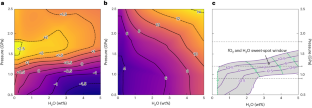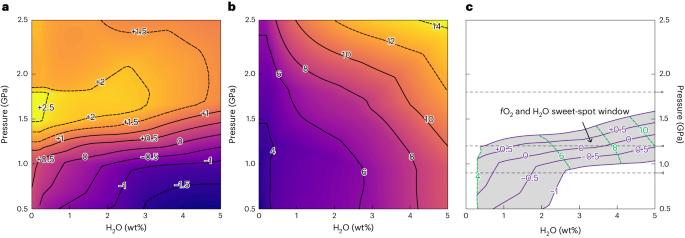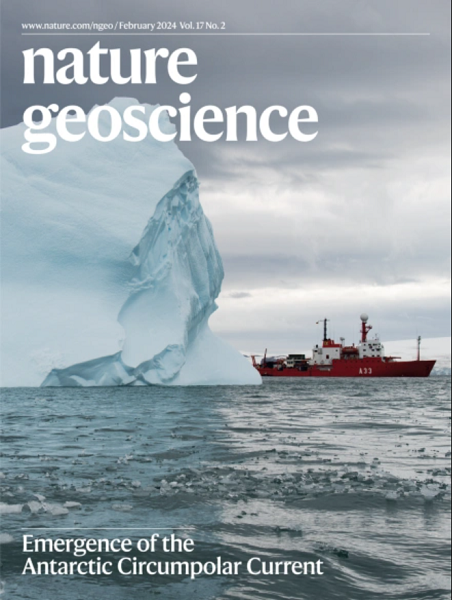Generation of Archaean oxidizing and wet magmas from mafic crustal overthickening
IF 15.7
1区 地球科学
Q1 GEOSCIENCES, MULTIDISCIPLINARY
引用次数: 0
Abstract
The geodynamic setting leading to the formation of Earth’s first continents remains debated. Zircons preserved in Archaean granitoids record evidence of a relatively oxidizing and wet magmatic source. Subduction-related mechanisms for the formation of Archaean granitoids have been invoked to explain these signatures, suggesting an early initiation of subduction on Earth between 4.0 and 3.6 billion years ago, in the Eoarchaean era. Here I use forward petrological modelling and Monte Carlo randomization models to show that relatively oxidizing and wet magmas resembling Archaean granitoids worldwide can occur from melts derived from the partial melting of an overthickened mafic crust in a non-subduction scenario. The formation of oxidizing and wet magmatic signatures is therefore not diagnostic of continental crust generation by subduction or of subduction initiation in the Eoarchaean. Instead, the apparent observed increase in oxygen fugacity and water contents during the Eoarchaean may indicate magmatic thickening and melting of overthickened crust with time, suggesting that this process may have contributed to the development of Earth’s first continents. The high oxygen fugacities and water contents recorded by zircons from Archaean granitoids can be explained by partial melting at the base of overthickened oceanic crust without requiring subduction, according to a phase equilibrium modelling study.


黑云母地壳增厚产生的太古宙氧化岩浆和湿岩浆
导致地球上第一块大陆形成的地球动力环境仍存在争议。保存在太古宙花岗岩中的锆石记录了相对氧化和潮湿岩浆源的证据。人们援引太古宙花岗岩形成的俯冲相关机制来解释这些特征,认为地球在距今40亿年至36亿年之间的始新纪早期开始了俯冲。在这里,我利用前向岩石学建模和蒙特卡洛随机化模型来证明,在非俯冲情况下,过厚的岩浆岩壳部分熔化所产生的熔融物,可以形成与世界各地太古宙花岗岩相似的相对氧化和湿岩浆。因此,氧化和湿岩浆特征的形成并不能诊断出大陆地壳是由俯冲作用产生的,也不能诊断出俯冲作用是在始新世开始的。相反,在始新世期间观察到的氧富集度和水含量的明显增加可能表明,随着时间的推移,过厚地壳的岩浆增厚和熔化,表明这一过程可能促成了地球上最早大陆的形成。
本文章由计算机程序翻译,如有差异,请以英文原文为准。
求助全文
约1分钟内获得全文
求助全文
来源期刊

Nature Geoscience
地学-地球科学综合
CiteScore
26.70
自引率
1.60%
发文量
187
审稿时长
3.3 months
期刊介绍:
Nature Geoscience is a monthly interdisciplinary journal that gathers top-tier research spanning Earth Sciences and related fields.
The journal covers all geoscience disciplines, including fieldwork, modeling, and theoretical studies.
Topics include atmospheric science, biogeochemistry, climate science, geobiology, geochemistry, geoinformatics, remote sensing, geology, geomagnetism, paleomagnetism, geomorphology, geophysics, glaciology, hydrology, limnology, mineralogy, oceanography, paleontology, paleoclimatology, paleoceanography, petrology, planetary science, seismology, space physics, tectonics, and volcanology.
Nature Geoscience upholds its commitment to publishing significant, high-quality Earth Sciences research through fair, rapid, and rigorous peer review, overseen by a team of full-time professional editors.
 求助内容:
求助内容: 应助结果提醒方式:
应助结果提醒方式:


